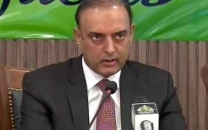Securing IMF trust through financial strength
Financial position of developing states remains fragile; they can dip into crisis as confidence of lender drops

Building financial capital is the hallmark of financial globalisation. Developing countries have to build financial capital to maintain the confidence of multilateral lender – the International Monetary Fund (IMF). By securing the trust of the lender, financial position is considered stabilised and financing would continue in order to meet the emerging cash commitments.
The government may build financial capital through two instruments: high real interest rate and primary surplus. Real interest rate is equal to nominal interest rate minus inflation rate. In the jargon, the equation is described as the real interest rate is equal to the nominal interest rate adjusted for inflation. For instance, the policy rate stands at 11% while core inflation is around 7%, then the real interest rate would become 4%. This rate is kept high to sustain the confidence of the lender.
The high real interest rate is used to keep the capital intact. In simple words, it means that domestic investors/ speculators/ industrialists do not export dollars legally or illegally as the country is already hungry for dollars.
In the jargon, capital flight is averted by keeping the rate high. In addition, the high real interest rate also attracts foreign capital. Hence, the lender continues lending to the borrowing country.
The second instrument is the primary surplus. It indicates that the current revenue of the government exceeds the current spending where interest payments on the outstanding government debt are excluded.
The government can control expenditure to some extent by either retrenching the existing departments or closing them down. Furthermore, it could even privatise certain departments to minimise its expenditure.
On the revenue front, it has the power to increase the tax rate. For instance, it normally increases the general sales tax (GST). Moreover, it has the ability to introduce new taxes. In this way, it spends less than it earns. All these measures are taken to show that the government would fulfil its debt commitments/ financial obligations.
The government completed fiscal year 2023 with a primary deficit. However, it achieved a primary surplus of around Rs952 billion in FY 2024. It enhanced the primary surplus to around Rs2.7 trillion in FY 2025 and scaled down the budget deficit to 5.4% of GDP.
The country's risk premium, which had shot up to around 14.2% in June 2023, came down drastically in August 2025.
The increased primary surplus further builds the confidence of the lender (IMF). That is the reason Moody's upgraded the credit rating of Pakistan to Caa1 in August 2025, which reflects a stable outlook. This stable condition also shows that the existing lending would continue at favorable rates and the government would get a few waivers as far as the Extended Fund Facility (EFF) is concerned.
The government may increase primary surplus for a couple of years. The benefit of primary surplus is that it slightly reduces the pace of debt accumulation. However, the fiscal deficit would remain intact. This fiscal deficit would add to the existing debt and hence the debt would accumulate. This will further increase the amount of debt servicing in the future.
In short, the continuation of primary surplus is very difficult. A developing country like Pakistan cannot build a permanent financial capital. Any external or internal event may dent the confidence of the lender.
Financial capital remains temporary and needs to be recreated and reinforced on a daily basis. Therefore, the financial position of a developing country remains fragile and it can dip into a financial crisis as the confidence of the lender drops which, in turn, reduces the amount of lending all of a sudden.
The writer is an independent economist and has authored a book: Pakistan's Structural Economic Problems in the era of Financial Globalisation





















COMMENTS
Comments are moderated and generally will be posted if they are on-topic and not abusive.
For more information, please see our Comments FAQ